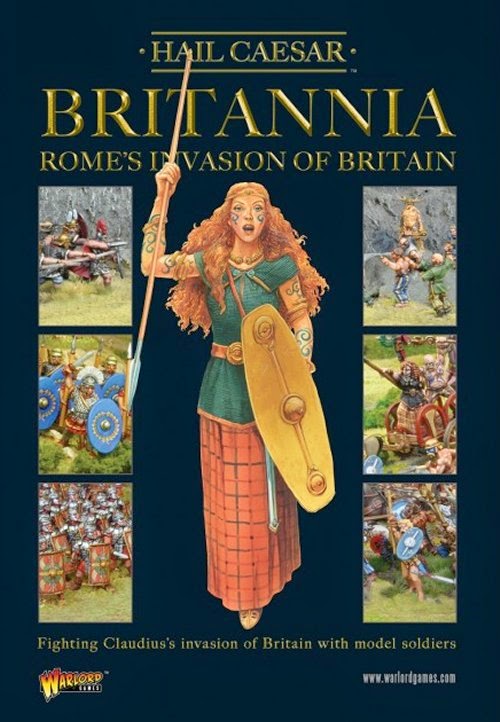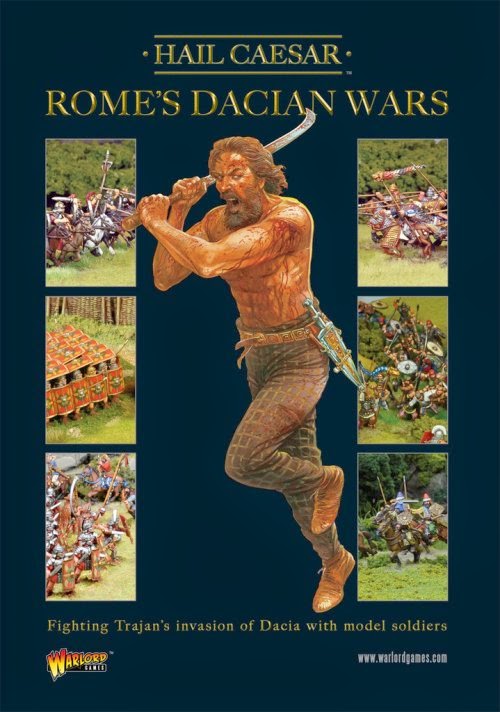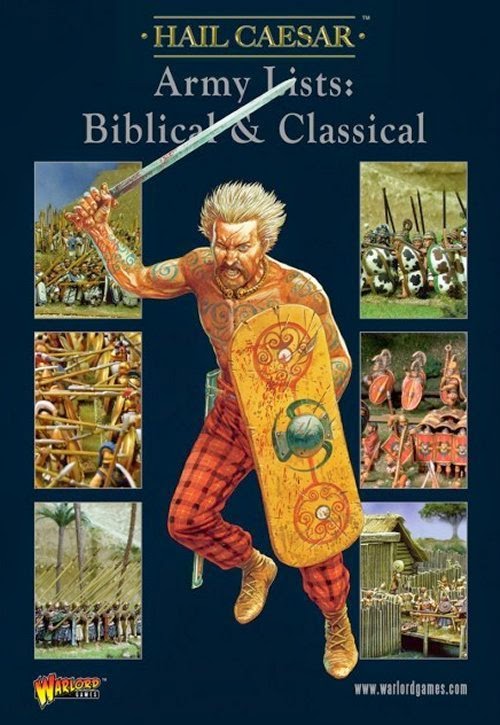Hail Caesar Wargaming Rules by Warlord Games is written by the hugely talented Rick Priestley who is something of an expert in Ancients gaming. Partly because of his studying in antiquities but some would say that it's also because he was there for the most part. So aside from firsthand experience of classical civilisations what else do you get?
A 192 page, full colour, hardback rulebook
By the award winning team that produced Hail Caesar
Covers gaming in periods from biblical times to the Crusades
An exclusive miniature - Titus Aduxas - when you order through the Warlord Games website! download.
Hail Caesar Supplements
Hail Caesar, Age of Caesar
Gaius Julius Caesar was surely the most famous Roman of all time – conqueror, statesman and founder of an empire that would shape the destiny of the world. What’s more, we know just how great a commander he was because he took the trouble to write and tell us so, recording his heroic exploits in all their gloriously impressive detail.
Join the mighty Caesar at the beginning of his glittering career of conquest and refight one of his most famous battles against those heinous enemies of civilisation, the dreaded Germans led by none other than that ambitious fiend Ariovistus of the Suebi.
March with Caesar’s legions into the land of implacable savages as our hero subjugates the barbarous Gauls and confronts that most dangerous of moustachioed monstrosities the treacherous chieftain of the Arverni tribe, Vercingetorix.
Cross the Rubicon and cast your own dice as Caesar pursues his rival Romans across continents in the Roman Civil War, facing his most deadly challenge yet in the form of famed conqueror of the East, Pompey the Great. Fight by Caesar’s side as he wages war for mastery of the Roman World upon battlefields soaked in Roman blood.
Regretfully we cannot tarry, as did Caesar, in the arms of Egypt’s beautiful Queen Cleopatra, but we can join him for the concluding battles of the Civil War in Africa, where we shall at last confront Caesar’s relentless opponents together with the armies of that inveterate enemy of Rome, King Juba of Numidia.
With this supplement for Hail Caesar we invite you to come, see and conquer for yourself in a series of new scenarios representing key battles in the career of Julius Caesar. We take a detailed look at the armies of Rome and her enemies, and we consider the lives of some of the greatest Roman commanders of them all, together with suitable rules to represent them on the tabletop.
A copy of the Hail Caesar rulebook is required to use this supplement.
Hail Caesar - Age of Bronze
For two thousand years; from 3000 BC to 1000 BC, warriors fought battles with weapons of bronze. This gleaming red-gold metal is an alloy of copper and tin. The warrior nobles rode into battle in chariots and were clad in bronze armour. Their followers gripped bronze thrusting spears, battle-axes and slashing swords. Battle was a dazzling sight as weapons and armour glinted in the sun amid the clash of bronze against bronze and the clatter of charging chariots. This was the heroic age of legend! When the sand and rubble is cleared away from the mighty ruins of the temples, tombs and strongholds of this time; the tales of these battles are revealed inscribed in stone and on the imperishable tablets of baked clay.
Around the ancient carvings of the warriors, which inspire the model soldiers depicted in this book, are the reports of their deeds on the battlefield. From what they tell us we can recreate battles for our model armies. In this book you will find many battle scenarios and skirmishes all based on real events. We begin with the Sumerians, rival city states. Then we see the rise and fall of the first great empire of the Akkadians. Ancient Egyptians fight to unite their nation and repel Hyksos invaders. The mighty Hammurabi takes on rivals to create the kingdom of Babylon. The chariot Empires of the Hittites and Mitanni clash and try and hold their own against the New Kingdom Pharaohs and the Mycenaeans. Egyptian and Canaanite chariots battle on the plain of Megiddo. Heroes fight duels upon the plain of Troy. Then Sea Peoples and Habiru tribes challenge the chariot lords as we approach the dramatic end of Bronze Age.
Age of Bronze contains 32 scenarios - in addition to the traditional Hail Caesar massed battles we introduce skirmish rules for smaller scale conflicts between warbands so often seen during this period.
Hail Caesar - Shield Wall - The Dark Age Sagas volume I
A notoriously unstable and rebellious member of the Roman Empire, Britannia was thrown into bloody conflict as the Western Roman Empire began to crumble. Axe, spear and sword became the dominant currency for those vying for control of the kingdoms.
Shield Wall is a supplement for Hail Caesar which introduces the main battles, armies and personalities of the Dark Ages in the British Isles from around 400AD up to 1000AD.
In addition to the traditional Hail Caesar massed battles the supplement introduces rules for smaller scale engagements between warbands as reflects much of this period. Shield Wall also contains campaign rules and several linked scenarios – from Badon Hill to Brunaburh.
The army lists are included for Limitanei, early and late Saxons, Romano-British, Welsh-Cymru, Irish, Picts, Gaels, Vikings and Irish-Norse.
A copy of the Hail Caesar rulebook is required to use this supplement
Hail Caesar - Germania
This 56-page sourcebook, written by Neil Smith, chronicles the devastating blow suffered by the Romans in the Teutoberger Wald at the hands of the Germanic tribes led by Arminius. The battle, also known by the Romans as the Varian Disaster, saw the Germans ambush and destroy three Roman legions and their supporting troops. The book covers both the battle and the aftermath - a period that was something of a watershed for Rome's ambitions in Germany...
Germania also covers the varying tribes that made up the Germanic forces as well as scenarios and special rules.
A copy of the Hail Caesar rulebook is required to use this supplement.
Hail Caesar - Britannia Romes Invasion of Britain
In 43AD Aulus Plautius led the Roman legions to the edge of the known world: to the mysterious land of the Britons. TheEmperor Claudius demanded a victory, and what better way of doing it than to bring this savage nation under the Roman yoke. Rome commanded huge armies of professional soldiers with the infrastructure needed to feed, transport, equip and command them. Opposing this mighty military machine was a mere patchwork of tribes and wild barbarian warriors. Refusing to yield to the conquerors, one man emerged as the champion of the Britons: Caractacus! Defeated in open battle, Caractacus turned to guerilla warfare: raiding and ambushing enemy troops on the march. No Roman could defeat him; in the end it was treachery that overcame the Briton's greatest champion: the treachery of Queen Cartimadua of the Brigantes.
It was another Queen of the Britons who, ten years later, led the greatest rebellion of all against Roman rule: Boudica, Queen of the Iceni. Years of resentment and oppression boiled over into a war that almost drove the Romans from Britain altogether,burning London and humbling even the mighty legions.
This then is the story of the Roman invasion of Britain, from the Claudian Conquest and wars of Caractacus until the defeat of Boudica and the destruction of the druids upon Mona. Included in this supplement is a map-based campaign game recreating the invasion, as well as historical scenarios covering the wars of Caractacus and the Boudican revolt.
A copy of the Hail Caesar rulebook is required to use this supplement.
Hail Caesar - Rome's Dacian Wars
Fighting Trajan's invasion of Dacia with model soldiers
At the end of the first century AD, the Roman Empire was the greatest military power the world had ever seen. All of Western Europe south of the Rhine and the Danube, southern Britain, North Africa, Egypt, the Balkans and most of the Levant was under its control. The mighty Roman army and its legions had rarely known defeat in living memory and never for very long.
One upstart state and its wily, aggressive leader refused to bend the knee. For almost twenty years, and against all odds, King Decebalus of Dacia defied Rome from his fortress capital deep within the Carpathian Mountains. Composed of thousands of savage tribesmen, heavily armoured Sarmatian lancers and even captured Roman weapons, Dacia's armies proved to be powerful enough to keep the legions at bay. All this was to change with the ascension of the soldier-emperor Trajan, leading to one of antiquity's greatest conflicts the Dacian Wars.
This supplement for Hail Caesar focuses on Rome's wars under Trajan against the Dacians and their Sarmatian allies. Featured battles include the Battle of Adamclisi, the Battle of Tapae and the Siege of Sarmizegetusa Regia. Also included are rules for playing skirmish games, fighting sieges and using warships, as well as campaign and hobby ideas.
A copy of the Hail Caesar rulebook is required to use this supplement.
Hail Caesar Army Lists - Late Antiquity to early Medieval
Our latest publication is the second army list book for Hail Caesar 84p softback book
The following armys are included:
- Palmyran
- Middle Imperial Roman
- Sassanid Persian
- Goths
- Early Saxon
- Franks
- Huns
- Late Imperial Roman
- African Vandals
- White Huns
- Gepids
- Spanish Visigoths
- Ostrogothic Italy
- Early Byzantine
- Lombards
- Scots-Irish
- Arthurian-British
- Welsh
- Merovingian Franks
- Avars
- Picts
- Khazars
- Arab Conquest
- Bulgars
- Tang China
- Thematic Byzantine
- Arab Empire
- Carolingean Franks
- Pecheneg
- Anglo Saxon
- Rus
- Vikings
- Almoravid Moors
- Fatamid Egypt
- Tagmatic Byzantine
- Al-Andalus
- Christian Spain
- Ghaznavid
- Liao China and Kara-Khitan Khaganate
- Norman
- Seljuk Turks
- Feudal French
- Feudal Germans
- Feudal Polish
- Early Hungarian
- Ayyubid Egyptians
- Sung China
- Italo-Norman
- Feudal Scots
- Early Russian
- Khwarazmian Persian
- Comnenian Byzantine
- Burid and Zengid Syria
- Japanese
- Plantagenet English
- Lombard League
- Crusaders
- Later Welsh
- Teutonic Crusaders
- Mongol
Hail Caesar Army Lists - Biblical & Classical
In this, our first expansion for Hail Caesar, Rick presents no less than 63 army lists for the Biblical and Classical periods along with points costs and army composition. It is also replete with the imgaes of fantastic armies that you can expect from a Warlord Games book. The armies covered are
Biblical
- Old and Middle Kingdom Egypt
- Nubian
- Akkad and Sumer
- Early Arab Raiders
- Amorite Babylonia
- Canaanites
- Hittites
- Mitanni
- Mycenean and Minoan
- New Kingdom Egyptian
- Early Assyrian
- North European Bronze age
- Libyan
- Sea Peoples
- Israel and Judeah
- Assyrian Empire
- Neo-Babylonian
- Urartu
- Scythian
- Saite Egyptian
- Lydian
- Kyrenean Greek
- Early Achaemenid Persian
- Early Carthaginian
- Hoplite Greek
- Thracian
- Samnites
- Later Hoplite Greek army
- Pauravan and Mauryan Indians
- Syracusian
- Camillan Rome
- Gauls
- Illyrian
- Later Achaemenid Persian
- Alexandrian Macedonian
- Qin China
- Alexander's Successors
- Hellenistic Greek
- Bactrian Grek
- Carthaginian
- Galatians
- Parthians
- Republican Rome
- Numidian
- Merotic Kushite
- Spanish
- Late Macedonian
- Seleucid
- Ptolemaic
- Han China
- Pyrrhic
- Celtiberian
- Early German
- Maccabean Jewish
- Sarmatians
- Artaxiad Armenian
- Ancient Britons
- Mithandric Pontic
- Dacian
- Marian Roman
- Imperial Roman
- Jewish Revolt
- Kushan
96 page softback book.
Other People's Hail Caesar Downloads
The Border Reivers Wargames Society
War of the Roses Mods Perry Miniatures
Hail Caesar Unit Reference Cards
Antigonid
Succeeding the Antipatrid dynasty in much of Macedonia, Antigonus ruled mostly over Asia Minor and northern Syria. His attempts to take control of the whole of Alexander's empire led to his defeat and death at the Battle of Ipsus in 301 BC. Antigonus's son Demetrius I Poliorcetes survived the battle, and managed to seize control of Macedon itself a few years later, but eventually lost his throne, dying in prison.
Antigonid Reference Cards
This file contains the following unit cards:
- Antigonus One-Eye (General)
- Demitrius (Commander)
- Phalangite Veternas
- Phalangite Infantry
- War Elephant & Crew
- Companion Heavy Cavalry
- Line Medium Cavalry
- Tarentine Light Cavalry
- Ballista Heavy Artillery
- Peltasts with Javelins
- Cretan Archers
- Unnamed Leader (value 8)
For much of its history, Carthage was in a constant state of struggle with the Greeks on Sicily and the Roman Republic, which led to a series of armed conflicts known as the Greek-Punic Wars and Punic Wars. The city also had to deal with the volatile Berbers, the indigenous inhabitants of the entire area where Carthage was built. In 146 BC, after the third and final Punic War, Carthage was destroyed and then occupied by Roman forces. Nearly all of the other Phoenician city-states and former Carthaginian dependencies fell into Roman hands from then on.
Carthaginian Reference Cards
This file contains the following unit cards:
- Hannibal Barca (General)
- Mago Barca (Commander)
- Hasdrubal
- Maharbal
- Liby-Phoenician Veterans
- Libyan Heavy Infantry
- Liby-Phoenician Medium Cavalry
- Spanish Scutarii
- African War Elephant & Crew
- Numidian Light Cavalry
- Ligurian Slingers
- Numidian Javeliners
In 307, the Fourth Diadoch War broke out. Again, Antigonus and Demetrius were fighting against Cassander and Ptolemy, who were now supported by Lysimachus, the ruler of Thrace, who invaded Asia Minor and captured Sardes and Ephesus. The troops of Demetrius, who were in Thessaly fighting Cassander, crossed the Aegean Sea and started on a march through Asia. At the same time, Cassander crossed the Hellespont, hoping to support Lysimachus, and Antigonus moved from Syria to Asia Minor, hoping that he and his son could defeat Cassander and Lysimachus in one decisive battle.
Confederated Allies Reference Cards
This file contains the following unit cards:
- Selucus Nicator (General)
- Cassander (Commander)
- Lysimachus (Commander)
- Phalangite Veterans
- Phalangite Infantry
- Greek Hoplites
- Thracian Light Infantry
- War Elephant & Crew
- Companion Heavy Cavalry
- Line Medium Cavalry
- Tarentine Light Cavalry
- Ballista Heavy Artillery
- Unnamed Leaders (value 8)
- Unnamed Leader (value 9)
Shadow Storm Fantasy Rules
Shadow Storm Fantasy Army Lists
My Hail Caesar Downloads & Adaptations
Warlord Games
Hail Caesar Unit Reference Cards
Ady's Wargames Den
The Border Reivers Wargames Society
Perry Miniatures









No comments:
Post a Comment